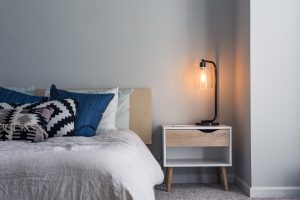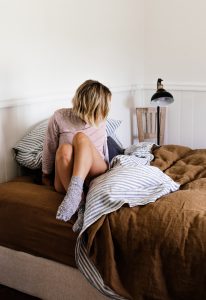How to Sleep Better –10 Tips from an Expert
It may surprise you to know that we spend around a third of our lives asleep. Sleep is an often forgotten aspect of health and wellbeing, but without it, we cannot function effectively. It’s a vital process that helps to restore and repair both brain and body.
Whilst this may seem obvious, sleep really can be the make-or-break factor in your day, and things always feel a lot harder when you are tired. We have teamed up with Infant Sleep Consultant, Annie Simpson, for some of her top tips that she gives clients. Whilst Annie specialises predominantly in helping infants and babies getting to sleep, her qualifications and expertise are transferrable to the rest of us tired folks, so we hope you find some of these 10 tips useful.

Photo by Vladislav Muslakov, Unsplash
1.Avoid using any screens at least two hours before bed
This is particularly targeted at students who are approaching exams, or those who are WFH and have spent the whole day staring at a screen. We can all appreciate how easy it is to ‘switch off’ by scrolling on our phones before bed. However, this has the opposite effect and actually wakes us up, because the blue light emitted by the phone suppresses melatonin levels, our natural sleep hormone. This makes it difficult to fall asleep, and also to wake up in the morning.
2. Keep an eye on how much caffeine you are drinking in the day
Whilst it might seem like a good idea to reach for coffee cup number 3 or 4 during the day, this could be impacting your quality of sleep. Everyone is different and we will all be affected by caffeine in different ways, however it is a good idea to follow the NHS guideline of not exceeding 300mg of caffeine each day: This is roughly 3 caffeinated drinks, including tea, energy drinks and some fizzy drinks.

Photo by Tyler Nix, Unsplash
3. Create a calm sleep environment
Here’s a chance to get creative and orchestrate your Pinterest mood-board bedroom of dreams. Whether you want to decorate with some house plants, a few candles, a rug and soft lighting, or just keep it simple and make sure your bedroom is clean, tidy and uncluttered, these little hacks will help you to switch off and relax into your sleep.

Photo by Christopher Jolly on Unsplash
4. Avoid working where you sleep
In the last few years with WFH, this tip has become more important than ever. It is all too tempting to wake up, reach for your laptop and have a ‘work duvet day’. But try to avoid this, because it will only make switching off before bed more challenging, as your mind is still in ‘work mode’. Your work and sleep environments should be kept separate as much as possible. However, we do appreciate that having a separate place to work in your home is often a luxury. So, if you are resident in a busy home and can’t work in a different room to where you sleep, then just try to get some fresh air at the end of your working day, to mentally divide the day, and help you rest well.
5. Ditch the socks!
You’ve probably heard a few discussions on whether or not it’s completely criminal to sleep in socks?! We can settle this debate once and for all – avoid sleeping in socks! Our hands and feet help to regulate our body temperature at night, so the steadier the temperature these extremities remain, the better night’s sleep you will have.

Photo by Rachel Claire on Pexels
6. Sleep really is the best medicine
Most of our immune system repair happens when we sleep, so if you are under the weather, sleep really is the best medicine. If you are feeling stressed, it can help to write down your worries in a notebook, so it transfers your stress somewhere else, and subsequently enables you to have a good rest.
7. Waking up in the middle of night? Avoid the phone!
If you wake up in the middle of night, try not to pick up your phone. Instead, do something mindless like check the expiry date on your herbs and spices, and stand with bare feet on the ground because this will kick start your melatonin release, and you should soon feel sleepy.
8. Keep daytime naps short and sweet
If you have had an unsettled night, try not to catch up on sleep the next day because it can impact your body clock. However, if you are really tired, it is better to have a 20-minute power nap than to sleep for an hour or so, because if you fall into your deep sleep, you will then feel groggy for hours.
9. How much sleep should I be having?
There is so much conflicting information online, but the answer is actually very simple: your body will tell you how much sleep you need. Science says that adults should aim for between 7-9 hours per night. You know you are having the optimum amount of sleep if your mood stays stable, concentration is good, and you have a reasonable amount of energy.
10. Incorporate some simple stretches into your night-time routine
Stretching is great for many reasons: it not only relaxes you but also keeps your muscles flexible and able for everyday activities. Engaging in simple stretches before bed can greatly impact and benefit the sleep your body gets throughout the night, by aiding relaxation and recovery. So, why not squeeze this in before you brush your teeth, or just after getting into your pyjamas. It doesn’t have to be complicated, just have a sit down and see which areas seem to need stretching, or follow a simple YouTube video.
Whilst sleep won’t make mental health struggles vanish, things can definitely feel worse when you are fatigued. So be sure to get as much rest as possible to restore your energy levels, and make your days feel as easy as they can.
Find out more:
Sleep Easy
Fun facts about sleep, why it’s so important, tips for better rest including help for snorers (or their partners)
7 Ways to Sleep Better
Tips for sleeping better in the winter months to feel less tired
NHS – Trouble sleeping?
Simple steps to ease those restless nights
